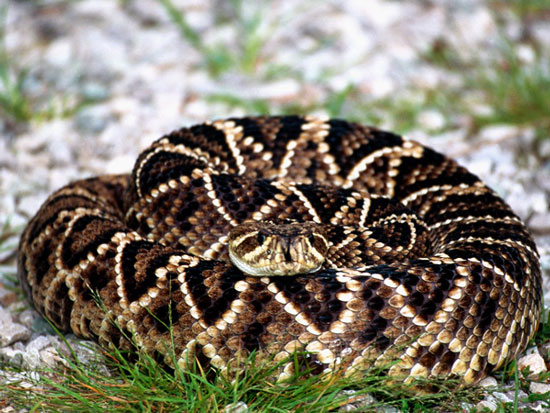Deciphering 'husbandless' in animals
Snakes and some other animals can give birth without a father, or store sperm for a long time.
According to Discovery, a study by North Carolina State University experts and Georgia State University showed that an Eastern Diamondback rattlesnake (a poisonous snake in the southeastern United States) gave birth to five children. years after mating. This is also the longest storage of sperms found in animals (except insects). Scientists also noted for the first time the reproduction of a cobra that has never mated.
Ecology expert Warren Booth of North Carolina State University says mating (mono) is now recorded naturally in all vertebrate animals, except for animals. mammal.'We confirm this ability in species such as pythons, rainbow pythons, some types of sharks, Komodo earth dragons and farmed turkeys , ' he added.

Eastern Diamondback rattlesnake
Mr. Booth analyzed DNA of a partnerless cobra for many years in North Carolina aquarium at Fort Fisher. Molecular DNA fingerprinting techniques eliminate the 'contribution' of males in the reproduction of female snakes, which produce a four-litter litter with normal appearance. Meanwhile, the Eastern Diamondback rattlesnake 'makes a slide' to 19 healthy offspring consisting of 10 females and 9 males. The process of DNA analysis confirms they have fathers.
Booth expert who studied with Gordon Schuett of Georgia State University said: 'The rattlesnake was arrested at the age of 1, so it is considered to be physiologically immature. It is kept isolated from males until delivery. Apparently this snake has mated in the wild when it is immature. ' According to two experts, the internal glands or the ability to partially twist the uterus can explain how rattlesnuts store sperm for 5 years. In the second possibility, Booth said that an area of the uterus twisted and pinched, acting as a blocker to isolate sperm until the time of ovulation.
Fish, birds, amphibians, insects and other reptiles can also store sperm for a long time. Mammals are less successful, but a recent study of yellow-bellied bats (found in many Asian countries) suggests that the offspring of this animal can store sperm for months.
In contrast, women can only store sperm for a few hours or days. Women cannot reproduce on a single basis because they need a certain gene for both men and women. Schuett explains, in the lab environment, scientists have 'dodged' this necessary condition for mammals by producing monogamous mice.
According to experts, sperm storage helps children overcome climate challenges and other obstacles. Single-sex reproduction can damage genetic diversity and only produce offspring of whole or male sex. But on the other hand, it can also eliminate genetic changes that can make individuals unwell.
The research results are published in the journal Biological Journal of the Linnean Society.
- 'Deciphering the snowman' mystery
- The father of Egypt learned to die of strange disease
- Deciphering 7 rumors - building nape hairs around the full moon
- Mysterious deciphering more than 300 years in elephants
- Deciphering altruism
- Clarify the evolution of underwater animals to the surface
- Anatomical sight of a
- The woman is able to communicate with ... animals, including dead animals?
- Animals are 'facing' the danger of extinction
- The superhuman 'eyes' of animals
- Animals that are capable of being
- Top animals 'longevity' that you didn't expect
 Animal 'suffering' after hibernation
Animal 'suffering' after hibernation Why do goats climb well?
Why do goats climb well? Scientists were surprised to see chimpanzees eating turtles
Scientists were surprised to see chimpanzees eating turtles Giant catfish died deadly due to drought in Thailand
Giant catfish died deadly due to drought in Thailand